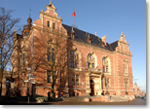Secretariat
Wały Jagiellońskie 1
80-853 Gdańsk Poland
tel. +48 58 301 09 17
tel. +48 58 301 91 23
fax +48 58 301 76 37
 Contact us
Contact us


UBC memorandum for the Council of the Baltic Sea
States Committee of Senior Officials meeting to be held in Brussels on January 25th
UBC appreciates that the sub-national level is invited to take part of the development of the Northern Dimension. It is of great importance also for the sub-national authorities in the Baltic Sea Region.
The Northern Dimension can be described as an addition to the European Union Policy caused by the new conditions in the Union after the accession of Sweden and Finland to the European Union. It became soon obvious that the European Union policies and strategies have been shaped from the conditions that prevailed in the "continental" Europe. Northern Dimension is thus an addition of aspects that became obvious when the two Nordic countries joined. Finland realised that first and presented the Northern Dimension, but it very soon got support from Sweden and subsequently from the other European Union countries.
The national governments that formulated the Northern Dimension and further discussed it with the European Union recognised many new characteristics to be added to EU policy. It was items like climate, proximity to the Russian federation, long distances and others. The next step was to formulate the Northern Dimension Action Plan, where also UBC has been invited to contribute.
However, the Northern Dimension should not be regarded as a finalised policy. There are still factors and aspects that are new to the European Union and which also should lead to adjustments in the policies of the Union.
UBC has for some time now argued strongly that is the Baltic Sea itself is missing as one important background factor in the Northern Dimension. The European Community was originally created by countries in the heartland of Europe. The traces of that origin can still clearly be seen in the practical implementation of the policies of the European Union, and they are sometimes disadvantageous for the Baltic Sea Region. UBC would like to mention two such effects of the present policies:
- The first is regarding cross-border co-operation.
The rules, concepts and regulations regarding cross-border co-operation clearly originate from "continental" Europe, which in fact is a continent surrounded by water and where the center of economic activity is inland. The Baltic Sea Region is the other way around: It is water, surrounded by land where the economic activity to a great extent faces the sea. The rules and concepts of cross-border co-operation therefore do not match the reality in the Baltic Sea Region, and we miss probably a lot of funding for cross-border projects of that reason. We have a severe lack of land borders and an abundance of maritime borders in our region.
The need of funding for cross-border co-operation was manifested by for example the recent Danish proposal for a solution on that problem. Unfortunately it did not work. If the EU concepts and rules for cross-border co-operation had been created in the Baltic Sea Region, they would have allowed co-operation between Gotland and Latvia, between north Denmark and West Sweden, between south-east Sweden and Lithuania, north-east Poland and Kaliningrad, to mention a few neighbouring regions with presently only minor possibilities for cross-border co-operation with European support. - The second aspect is how EU treats the Trans European Network. The problems are also derived from the lack of Baltic Sea in European policies, which is why TEE is solely based on railways and motorways. We who live in the Baltic Sea Region all acknowledge the importance of the maritime highways on the ferry lines. Finland and Sweden can from all practical standpoints be considered as islands, since such a great deal of foreign trade and travel pass the Sea.
The conclusion would be that the Northern Dimension should not be considered as static or finalised but must be further developed. The sub-national level should be part in that development in order to catch up with a full range of opinions and experiences from all levels.
But the next accession to the European Union, when the present application countries will join, will be even more important and have quite another scale than when Sweden and Finland joined. It is foreseen that the new EU members must take EU as it is. But the day they have joined, they are full members of the community and as such they must also have the same possibilities to develop EU as the present member states.
Perhaps the next step would be to prepare for the development of an Eastern Dimension, where conditions that are particular to the new member states must sooner or later be a part of the policy of EU as a whole. It would be beneficial if the sub-national level could participate in that process already from the beginning.
It is far too early to say something about the content of such an Eastern dimension, but we all know the great differences between present EU and the applicant coutries.
So, to conclude, UBC would like to put forward the following proposals:
- The development of the Northern Dimension must continue and should not yet be considered as something finalised - there are still several problems attached to the implementation of EU policies in the Baltic Sea Region. CBSS can be a co-ordinating partner in that work, taking into account the excellent and very friendly co-operation and openness towards sub-national organisations like UBC.
- We might start thinking of the creation of an "Eastern Dimension", perhaps through a think-tank or informal working group that can discuss these issues. CBSS could be a very feasible co-ordinating partner also in that process, because UBC feels confident that in such a case also UBC would be invited to participate.




